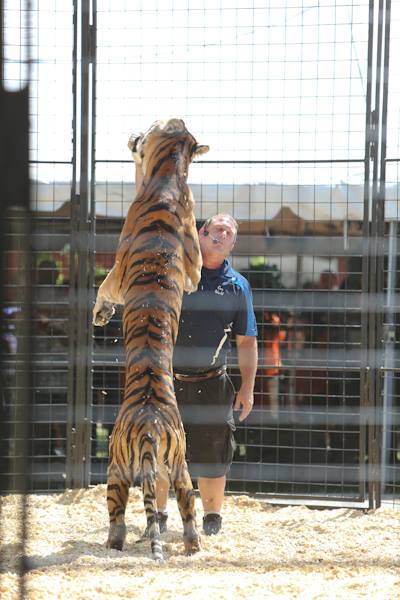Joan Byron-Marasek Tigers Only Preservation Society
Joan Byron-Marasek Tigers Only Preservation Society
Moving Day For Tiger Lady’s Cats
Nov 11, 2003 12:46 pm US /Pacific
TRENTON (AP) Nearly five years after a loose tiger wandering this Ocean County community triggered a crackdown on a privately run sanctuary for big cats, animal welfare workers began removing the 24 Bengal tigers Tuesday, preparing them for shipment to a Texas animal sanctuary.
By 3 p.m. , 18 tigers had been loaded onto trucks, including some that had to be sedated with tranquilizer darts. A convoy of four trucks was expected to leave the Tigers Only Preservation Society on Tuesday night, bound for the Wild Animal Orphanage in San Antonio , which authorities said is better equipped to care for them.
The move ends a protracted struggle between the cats’ owner, Joan Byron-Marasek, who has become known as the “Tiger Lady,” and state wildlife officials, who say the animals were being kept in deplorable conditions and needed to be taken away.
“I’m so glad to see this is finally coming to a resolution,” said Marty McHugh, director of the state Department of Environmental Protection’s Division of Fish, Game and Wildlife. “These animals have been living in such terrible conditions. This is the right thing to do. Getting them out to Texas is the best thing that could happen to them, and to this community.”
The strange saga began in January 1999, when a loose tiger wandering near Byron-Marasek’s property was shot and killed by authorities. State officials never proved the tiger belonged to Byron-Marasek, but criticized conditions at her facility and denied the renewal of her permit to keep the tigers.
Her appeals to overturn that decision were exhausted in November 2001, and a state Superior Court judge authorized a plan to move the animals.
Byron-Marasek was at the compound when the workers arrived, but she left in a taxi around 7 a.m. , crouching down so photographers could not taker her picture. She was not immediately available for comment.
McHugh said Byron-Marasek had obtained a hearing in U.S. District Court in Camden that was scheduled for Wednesday afternoon to try to seek some sort of post-event relief. Her most recent attorney, Darren Gelber, did not return a phone call seeking comment Tuesday.
The tiger compound divided neighbors in this rapidly growing community of single-home subdivisions nestled among the scrub pines about halfway between New York and Philadelphia . Supporters said Byron-Marasek was being targeted by overzealous bureaucrats, while opponents dreamed of the day when there were no longer any tigers in the area.
“I just don’t feel they should be penned up. That’s what Great Adventure is for,” said neighbor Marge Richmond, referring to the nearby theme park that includes a drive-through safari with wild animals. “You want a pet? Get a dog.”
John Poulos carried a hand-made sign outside the compound that read “Let The Tigers Stay.” He blamed recent arrivals for Byron-Marasek’s troubles.
“She’s been here for 20 years,” Poulos said. “These people move from New York and North Jersey and never checked where it was they were moving to.”
Getting the big cats out of their cages proved tricky. In some instances, workers lured them into rolling portable cages with meat. Others had to be gently prodded. Still others refused to go, roaring and lashing out at workers.
“They’re being extremely aggressive,” said Carol Asvestas, director of the Wild Animal Orphanage. “They’re just not very happy right now.”
Five tigers had to be sedated with darts containing a mixture of Valium and ketamine, an animal tranquilizer.
Asvestas said she was appalled at the physical condition of the tigers, who she said were soaked in urine and caked with mud and feces. One tiger had neurological problems that would not allow it to hold its head straight.
Another was severely dehydrated and has sores on its feet.
“I think it’s criminal for the government to give permits to facilities like these,” she said.
Asvestas said her 102-acre facility is already home to 600 wild animals, including 42 other tigers, as well as monkeys, bears and other animals rescued from private ownership. It is registered with and routinely inspected by the United States Department of Agriculture.
The convoy heading to San Antonio will be staffed by several relief drivers, two veterinarians and 10 animal caretakers. If all goes well, the tigers should be at their new home by Wednesday night, officials said.
The move will cost nearly $300,000. New Jersey will provide $120,000, and the International Animal Welfare Fund, a group lobbying for an end to private ownership of big cats, is contributing another $120,000. It was not immediately clear who would pay the remaining $60,000. McHugh said the state plans to move in court to recoup its costs from the case from Byron-Marasek.
Tiger lady ordered to repay state for expenses for moving cats
News in brief from around New Jersey
March 20, 2004 , 2:42 PM EST
TOMS RIVER , N.J. — The Ocean County woman whose private tiger compound was shut down by the state last fall has been ordered to repay New Jersey the cost of relocating her 24 big cats to a Texas refuge.
In November, the Department of Environmental Protection seized the Bengal tigers from the Tigers Only Preservation Society in Jackson and trucked them to San Antonio , ending a court battle over the cats that began in 1999.
On Friday, Superior Court Judge Eugene D. Serpentelli ordered Joan Byron-Marasek and her husband to reimburse the state $144,555 in costs associated with moving the cats to the Wild Animal Orphanage in San Antonio .
On behalf of the DEP’s Division of Fish and Wildlife, the state attorney general’s office argued the relocation broke the budget of the Non-game and Exotic Species Program, which handles inspections of zoos and similar facilities.
State officials said the tiger transfer cost a total of $290,000, which included the expense of building a facility at the San Antonio refuge to house the New Jersey tigers.
The International Fund for Animal Welfare picked up part of the tab.
State officials say they are prepared to place a lien on Byron-Marasek’s property if she does not reimburse the state for the expenses.
Byron-Marasek lost her permits for the cats after a 430-pound Bengal tiger was shot and killed when it was found roaming in Jackson in January 1999. She denied the tiger came from her 15-acre compound.
State officials subsequently inspected her compound and ruled it substandard, triggering four years of court wrangling.
Byron-Marasek did not attend Friday’s hearing.
However, she did submit legal briefs in which she argued the state wrongfully shut down her preserve. She disputed assertions the facility was substandard and alleged the state’s actions resulted from efforts to force her to sell her property, which lies within a commercially growing area just north of Interstate 195.
http://www.newsday.com/news/local/wire/ny-bc-nj-tigerlady0320mar20,0,3312667.story?coll=ny-ap-regional-wire
Check for yourself to see if Tigers of the Wild meet the sanctuary standards for an accredited animal refuge.

